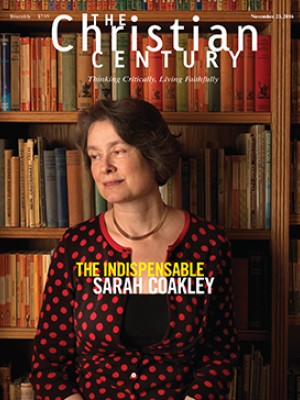December 18, Fourth Sunday of Advent: Matthew 1:18–25
Matthew's geneaology underscores that God has always worked through messy and broken families.
There are multiple Greek words for birth that Matthew could use to begin his Gospel and describe the birth of Jesus. The one he uses is genesis. The genealogy that prefaces Matthew’s birth story seems as orderly as the first six days of creation. The names are what we expect, all the greatest heroes of Jewish history.
Scratching the surface exposes more complicated truth. Abraham sets aside his oldest son, while Jacob cheats his brother out of his birthright. David murders a man to prevent a scandal. The women Matthew includes aren’t much better. Tamar plays prostitute; Rahab actually is one. Ruth is a foreigner. Yet all have their place in the new creation of Jesus.
Read our latest issue or browse back issues.
As Joseph enters the story, we are primed to hear of Jesus’ genesis in a new kind of way. By the time a direct descendant of Abraham finds his betrothed pregnant with a child not his own, the messiness of family life has been well established.
Mary is “found with child,” and I can’t help but wonder who found her. Mary’s situation must have been known by some, perhaps by all: her parents, the village busybodies, maybe even the local rabbi. Joseph has to do something, but what?
He has no good options. Divorcing Mary quietly might be the just thing to do, but it isn’t good. She might not be stoned to death, as Levitical law contends, but without a man to keep her she might well be reduced to begging or forced into prostitution. If instead Joseph marries a seemingly unfaithful woman, he himself is tainted by her sin. And that’s not the worst of it. Joseph runs the risk of nurturing an interloper in his own dynasty. In patriarchal terms, Mary’s son stands to inherit the birthright of Joseph’s own biological child. Joseph is still considering when an angel appears.
The first words out of an angel’s mouth are almost always “Do not be afraid.” It may be that seeing an angel is frightening, but it seems just as likely that angels encounter people in situations where they are already afraid. Joseph in Matthew’s Gospel and Mary in Luke’s are no exception. On the cusp of marriage, they find themselves with a pregnancy they didn’t seek or expect. The very existence of this child may well threaten their place in their community, their synagogue, and their families. Their own relationship may be broken before it has even begun. In the face of this new beginning, fear seems reasonable.
Yet maybe things aren’t as new as they seem. Matthew’s genealogy underscores that the more things change, the more they stay the same. God has always worked through messy and broken families, restoring them and bringing hope. Isaac will not be sacrificed; Judah will have sons. Rahab will save the people; Ruth will be claimed a matriarch by a people not her own. God will choose the unlikely one, the second son, the barren woman, the one who seemed beyond redeeming. Shame and heartache are not foreign to God. There is truly nothing new under the sun.
For proof, note that God will help Joseph, son of Jacob, in the same way God helped another Joseph, another son of Jacob, farther back on the family tree. As then, a dream will illuminate an escape from shame and death. God will provide a path to salvation consistent with that which has come before.
More than any other Gospel, Matthew views the Jesus story as the continuation of the Old Testament. Beyond the figures of the Pentateuch and the histories, Jesus fulfills the prophets’ vision. Eight times Matthew writes that Jesus “fulfills” what was spoken by the prophets; the first occurs in this week’s reading. Matthew’s explanation of the virgin birth, Joseph’s dream, the angel’s visit, and a new name are rooted firmly in the past. The virgin birth and the naming of Jesus are not original; they are the completion of what was once begun.
God created the world in the beginning; now God creates it anew in Jesus. God who made the universe out of nothing decides to do something even harder: enter into a human family. Despite its messiness and failure, its sin and sorrow, its brokenness and despair, God will redeem Abraham’s line. God will fulfill the promise made to Abraham and his descendants, that through them God will bless all the families of the earth.
And we are part of this genesis, this new creation. Through the waters of baptism, Jesus becomes our brother and we children of God. Consequently, just as God enters the story of Abraham’s family, God enters our own. Our genealogies—with their complexity, their secrets, and their shames—are now part of Jesus’ story too. Abraham and Isaac, Jacob and Joseph, Tamar and Rahab, Mary and Joseph—none of them is beyond God’s capacity to love and save. Neither are we.
Christmas will be our confirmation. In these remaining days of Advent we look with hope and expectation for genesis. The child born into Mary and Joseph’s family is born into our family as well. God will make the world new through him—and, because of him, through us.





